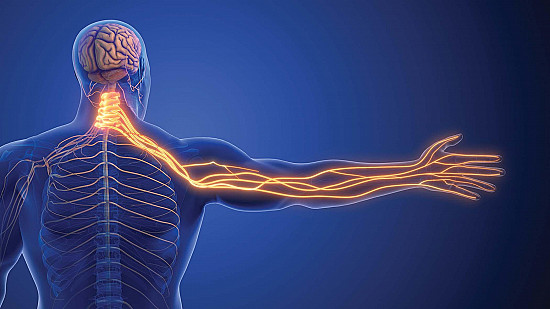Parkinson's disease
- Reviewed by Robert H. Shmerling, MD, Senior Faculty Editor, Harvard Health Publishing; Editorial Advisory Board Member, Harvard Health Publishing
What is Parkinson's disease?
Parkinson's disease (PD) is a disease of the central nervous system. It causes problems with body motions, including
- tremor (shakiness)
- rigidity (muscle stiffness)
- slowed body movements
- unstable posture
- difficulty walking.
PD develops when certain nerve cells (neurons) in the brain die. These are neurons that produce a chemical called dopamine. Dopamine helps relay messages between areas of the brain that control body movement.
When these neurons die, abnormally low levels of dopamine are produced. This makes it difficult to control muscle tension and muscle movement.
Having a parent or sibling diagnosed with the disease at a younger age (before age 50) increases your risk of getting PD. The same is not true if the affected family member was older when diagnosed. Symptoms of PD may begin in middle age but the average age of diagnosisis 70 years old. A small number of patients have early onset PD.
Symptoms of Parkinson's disease
PD usually begins as a slight tremor or stiffness. It occurs in the arm or leg on one side of the body. The tremor is most obvious at rest. It is regular, typically occurring three to six times per second.
The PD tremor:
- usually worsens under stress
- improves when the arm or leg is moved voluntarily
- may disappear entirely during sleep.
At first, PD may be evident only as a tremor involving the thumb and index finger. It looks as if the person is manipulating a small object (which is why the tremor is often described as "pill-rolling."
As the illness worsens, tremors may become more widespread. They eventually affect limbs on both sides of the body. Handwriting may become small, shaky, and eventually illegible.
PD often causes stiffness or rigidity in the arms or legs. In addition, there is a slowing of body movements, called bradykinesia.
Rigidity and bradykinesia can be the most disabling aspects of the disease. They can impair the person's ability to walk. They can make it difficult to perform daily activities. These may include washing, dressing, or using utensils.
Problems with unsteady balance and posture may make it hard to sit down in a chair, or to rise from one. Walking is accomplished with small, shuffling steps and a stooped posture.
Bradykinesia can affect the facial muscles. It can decrease spontaneous facial expressions and normal eye blinking.
Other symptoms of PD may include
- depression
- anxiety
- disturbed sleep
- memory loss
- slurred or abnormally soft speech
- difficulty chewing or swallowing
- constipation
- impaired bladder control
- abnormal regulation of body temperature
- sexual dysfunction
- cramps, numbness, tingling, or pain in the muscles.
Diagnosing Parkinson's disease
Your doctor will examine you. He or she will pay extra attention to the neurological examination.
Your doctor will look for symptoms of PD, especially:
- the classic PD tremor
- slowness of movement
- rigidity
- gait problems.
There is no specific diagnostic procedure or laboratory test to establish a Parkinson's diagnosis. Doctors diagnose the disease based on the symptoms and physical and neurological exams.
If a patient's symptoms improve after taking PD medication, the diagnosis is probably correct.
Expected duration of Parkinson's disease
PD is a chronic, often progressive illness.
Preventing Parkinson's disease
Doctors are not sure what causes PD. There is no known way to prevent it.
Treating Parkinson's disease
There is no cure for PD. But its symptoms can be treated with several different types of medication.
When symptoms are not overly troublesome, medication may not be necessary. Early treatment may even increase the chance of developing side effects and other complications later.
Treatment usually is started when
- symptoms interfere with
- work
- management of household affairs
- other activities
- difficulty with walking and balance becomes significant.
Medications
Medications used to treat PD either boost the levels of dopamine in the brain or mimic the effects of dopamine. A number of medications for PD are available in pill form, while others can be given by injection or through a tube in the intestinal tract.
Oral medications
The most commonly used medication for PD is levodopa. Levodopa is converted to dopamine in the brain.
Levodopa usually is prescribed in combination with another drug called carbidopa. The second drug increases the amount of active drug that reaches the brain. It may also reduce side effects. The two drugs, levodopa and carbidopa, are combined in one pill (Sinemet).
Nearly all patients with PD improve after they start taking levodopa. However, long-term use often causes side effects and complications. Doctors often need to adjust the frequency and dose of levodopa so the person can continue taking it.
Several medications can be used either alone or in combination with levodopa to treat symptoms.
For mild symptoms in early PD, amantadine (Symmetrel) helps release stored dopamine in the brain.
Another treatment option for early PD is a monoamine oxidase-B (MAO-B) inhibitor, such as selegiline (Carbex, Eldepryl) rasagiline (Azilect), and safinamide (Xadago). MAO-B inhibitors boost the effectiveness of the dopamine that the brain is still making. They may delay the need for stronger drugs. Eventually, though, most people taking an MAO-B inhibitor will need a levodopa-containing drug.
Dopamine agonists mimic the effects of dopamine. Some of the commonly used dopamine agonists, such as pramipexole (Mirapex), ropinirole (Requip), and transdermal rotigotine (Neupro), may be used to delay the need for levodopa. Older patients can be especially sensitive to these drugs. They can cause confusion, sedation, hallucinations, and weakness due to low blood pressure. Also, some people develop impulse control disorder, such as a new gambling problem.
Drugs called COMT inhibitors also can be used in combination with levodopa. COMT inhibitors, such as entacapone (Comtan), opicapone (Ongentys), and tolcapone (Tasmar), prolong the action of dopamine in the brain. They also increase the effectiveness of levodopa. When a COMT inhibitor is added, the doctor usually lowers the levodopa dose.
Anticholinergic medications also help relieve mild symptoms in early PD. Choices include trihexyphenidyl (Artane, Trihexane, Trihexy) and benztropine (Cogentin). Anticholinergic drugs are particularly effective against tremor. But their use has become less common over time due to the availability of other treatments and their possible side effects, including confusion and hallucinations, especially in older individuals.
Injected or infused medications
A few medications for PD may be given through an intestinal tube or by injection under the skin to reduce symptoms when other options have failed. Examples include:
- levodopa-carbidopa intestinal gel: medication is delivered through a tube inserted into the upper intestine
- continuous subcutaneous apomorphine: this dopamine mimic is injected continuously under the skin
- continuous subcutaneous foslevodopa-foscarbidopa: this medication is converted by the body to levodopa-carbidopa and is continuously delivered under the skin by a pump.
Surgery
Surgery is considered when patients stop responding well enough to medications. Surgical options include:
- deep brain stimulation: the electrodes are placed after brain mapping.
- precise destruction of targeted areas in the brain: destroyed areas are responsible for the most troubling symptoms.
When to call a professional
Call your doctor if you develop any of the symptoms of PD.
Also call if you:
- notice a persistent tremor or stiffness anywhere in your body
- have trouble walking
- have trouble rising from a chair
- have any symptoms of depression.
Prognosis
There is no cure for PD. But a well-constructed treatment plan allows many patients to lead active lives with a good quality of life.
The prognosis is better when accompanying conditions are identified and treated. For example, depression is common among people with PD, and many such patients improve with antidepressant medications.
In addition, prognosis may improve with regular exercise and a balanced diet, as these may help to improve a patient's overall sense of well-being and body control.
Additional info
National Parkinson Foundation
https://www.parkinson.org
American Academy of Neurology
https://www.aan.com/
About the Reviewer

Robert H. Shmerling, MD, Senior Faculty Editor, Harvard Health Publishing; Editorial Advisory Board Member, Harvard Health Publishing
Disclaimer:
As a service to our readers, Harvard Health Publishing provides access to our library of archived content. Please note the date of last review or update on all articles.
No content on this site, regardless of date, should ever be used as a substitute for direct medical advice from your doctor or other qualified clinician.















